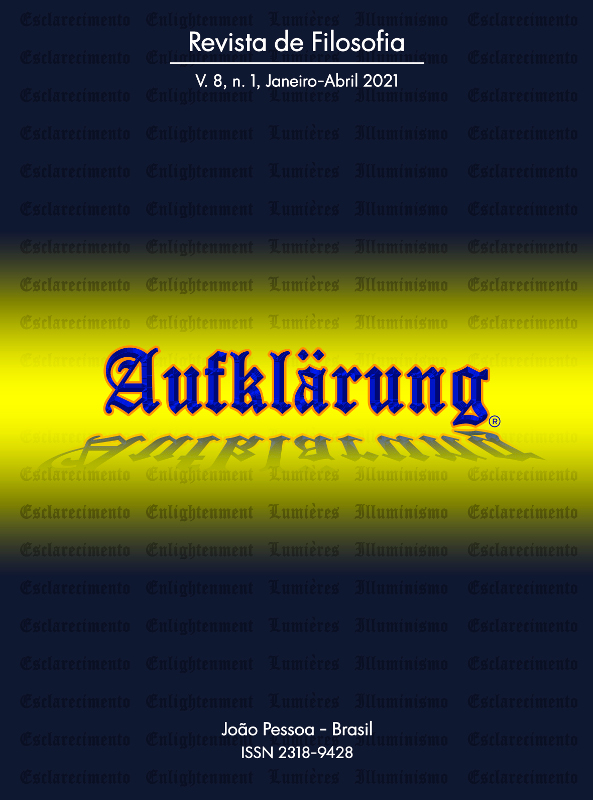The political rationality of the pious Oedipus
DOI:
https://doi.org/10.18012/arf.v8i1.56184Keywords:
Politics, Polis, Rationality, PityAbstract
This article aims to examine some the Sophoclean tragic hero’s marks of rationality Oedipus, showing that the presence of piety and recourse to the gods should not be understood as irrational. As will be evidenced, in the democratic polis there was no split between religiosity, institutional politics and political action. Furthermore, it cannot be inferred that the play Oedipus at Colonus is a mere exaltation of piety at the expense of reason. Indeed, this dilemma appears to be eminently modern. To prove this hypothesis, this article analyze the Sophocles' tragic hero, his innovative character. Then, the complementarity between the divine order and the rational order in the polis is examined. Finally, political rationality is shown in the play Oedipus at Colonus, indicating that it is not a piece of simple exaltation of piety at the expense of reason.
Downloads
References
ALVES, M. A. S.. Direito, poder e saber em Édipo Rei de Sófocles. Revista da Faculdade de Direito Milton Campos, v. 17, p. 107 – 126, 2008. http://ufmg.academia.edu/MarcoAntonioSousaAlves/Papers/472944/Direito_poder_e_saber_em_Edipo_Rei_de_Sofocles.
CARTER, D. M.. The demos in Greek tragedy. The Cambridge Classical Journal, 56, p. 47-94, 2010, doi:10.1017/S1750270500000282.
ESPOSITO, S.. The Changing Roles of the Sophoclean Chorus Author. Revista Arion, vol. 4, n. 1, p.104-105, 1996. http://www.jstor.org/stable/20163602.
FOUCAULT, M.. A Verdade e as Formas Jurídicas (Trad. Roberto C. M. Machado e E. J. Morais). Rio de Janeiro: NAU Editora, 2002.
INCERTI, F.. O visível e o sonoro em Édipo-rei: uma análise foucaultiana (Tese de Doutorado, Pontifícia Universidade Católica de São Paulo, São Paulo), 2013.
KNOX, B.. The heroic temper: studies in Sophoclean trgedy. Los Angeles: University of California Press, 1983.
LIMA, G.. Racionalismo, Hamartia e Ambiguidade em Édipo rei de Sófocles. Revista Sitientibus, n.12, p.7-20, 1994, Feira de Santada. Disponível em: http://www2.uefs.br/sitientibus/pdf/12/racionalismo_hamartia_e_ambiguidade_em_edipo.pdf. Acesso em 20 de abril de 2020.
MELO, J. & SOUZA, P.. A Influência da Religião na organização da Sociedade Grega no processo de transição do Gênos para Polis, 2009. Disponível em: <http://www.achegas.net/numero/37/joaquim_37.pdf> Acesso em 16/ 06/2009.
OBER, J. e STRAUSS, B.. Drama, Political Rhetoric, and the Discourse of Athenian Democracy. In. Winkler, J. J., Zeitlin, F. I. (orgs.). Nothing to Do with Dionysos? Athenian Drama in Its Social Context. Princeton: Princeton University Press, 1991.
PARKER, R.. Gods Cruel and Kind: Tragic and Civic Theology. In. Pelling, C. (org.). Greek Tragedy and the Historian. Nova Iorque, Oxford University Press, 1997.
PLATÃO. Gógias (Trad. Daniel Lopes). São Paulo: Perspectiva, 2011.
SÓFOCLES. Trilogia tebana: Édipo rei, Édipo em Colono, Antígona (Trad. Mário da Gama Kury). Rio de Janeiro: Zahar, 1990. (livro eletrônico)
STRAUSS, L.. What is Political Philosophy? And other Studies. Chicago, Universaty of Chicago Press. In. STRAUSS, L. An introduction to political philosophy: ten essays by Leo Strauss. Editado com introdução por Hilail Gildin. Detroit, Wayne State University Press, 1988.
TIERNO, P.. Contingencia política e imitación trágica. Equipo Federal del Trabajo, v. 49, p. 57-67, 2009.
TIERNO, P.. Formação da polis e o surgimento da democracia na Grécia antiga: história e consciência da Atenas clássica. Hologramática (Lomas de Zamora), v. 21, p. 99-119, 2014.
TIERNO, P.. La justicia y los antigos griegos. Anacronismo e irrupción. Revista de teoría y filosofía política clásica y moderna, v. 1, p. 11-43, 2011.
Versényi, L.. Oedipus: Tragedy of Self-Knowledge. Arion, vol. 1, No. 3, pp. 20-30, 1962. http://www.jstor.org/stable/20162791.
VIDAL-NAQUET, P. & VERNANT, J.P.. Mito e tragédia na Grécia Antiga. São Paulo: Editora Perspectiva, 2014.
Additional Files
Published
How to Cite
Issue
Section
License

This work is licensed under a Creative Commons Attribution 4.0 International License.
Journal general policy
1.This journal works under a Creative Commons License aplied to online journals. That icence can be read in the following link: Creative Commons Attribution 4.0 International (CC BY 4.0).
2.Accordingly to this License, a)the journal declares that authors hold the copyright of their articles without restrictions, and they can archieve them as post-print elsewhere. b)the journal allow the author(s) to retain publishing rights without restrictions.
Metadata Policy for information describing items in the repository
1. Anyone may access the metadata free of charge at anytime.
2.The metadata may be re-used in any medium without prior permission, even commercial purposes provided the OAI Identifier or a link to the original metadata record are given, under the terms of a CC BY license refered for the Journal.







































